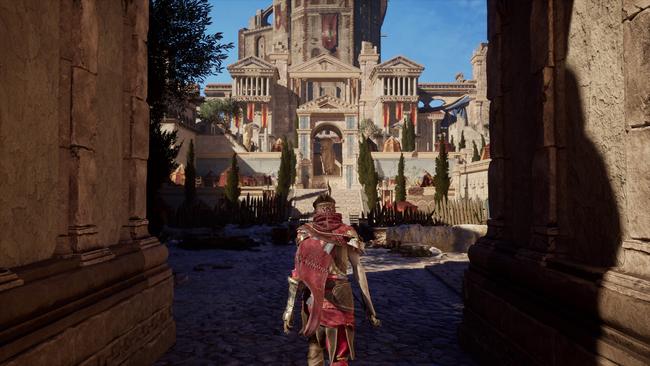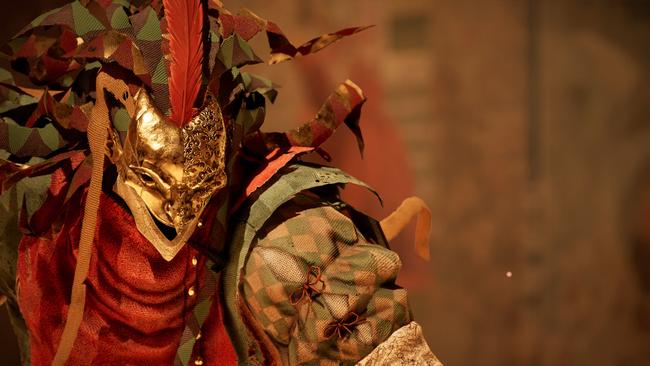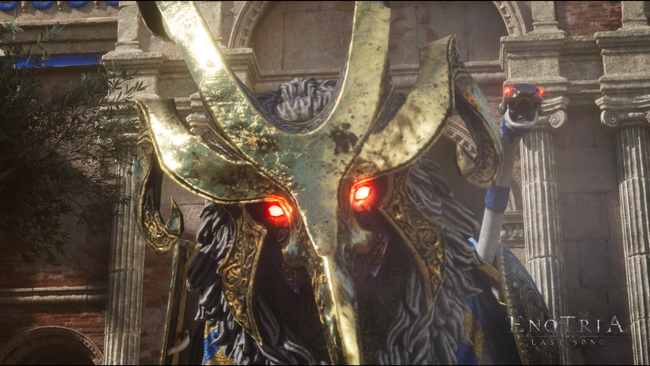
Enotria: The Last Song Review
We all remember our first Soulslike, the subgenre that has exploded in popularity over the last 15 years. My first was the original Demon’s Souls on the PlayStation 3 back in 2009. The game knew it was tough, coming bundled with a strategy guide to help players navigate the punishingly brutal world and unusual gameplay facets for the time. Since then, this game style has become mainstream, with tenets of the genre becoming commonplace. Now it seems we are treated to a Soulslike every few weeks. Developer and publisher Jyamma Games pays homage to FromSoftware’s early outings while trying to chart their own course with Enotria: The Last Song, as it draws inspiration from the genre’s origins while incorporating Italian culture and folklore. Gorgeous locales and an intriguing narrative make up for ambitious but clunky combat.
Enotria has players control the “maskless one,” a living puppet tasked with breaking the Canovaccio, a curse which has gripped the land. Villagers are seemingly trapped in an endless theatrical performance, repeating songs and dances against their will in perpetuity. It’s an interesting premise mostly told through in-menu exposition or vague hints from the game’s handful of NPCs. Players will explore the world through a variety of gorgeous landscapes including lush, green backgrounds. It’s not all going to be Tuscan villas and Roman baths, however. There are plenty of dark and dank corridors to visit as you push through each disparate zone, stopping at each new campfire to refill potions, upgrade weapons, and expend Memoria (the game’s version of Souls, serving as both experience points and currency) to raise levels and increase stats.
Let’s be clear: combat is the main course here, and it is relatively simple enough to grasp. Players will learn the movement patterns of enemies to ascertain when to dodge, roll, parry, and attack. Successful parrying and landing successive combos fills up what is essentially a stagger meter: fill it and players can execute a devastating blow. Your maskless one’s skills are slowly developed by activating perks and abilities (called “mask lines”) through a skill tree, adding another layer of customization.

Enotria allows players to cycle between three loadouts at any time, providing flexibility and options for various styles of play. These loadouts allow players to change not only weapons and abilities, but also their masks, which bestow specific bonuses or attributes. Savvy players will build loadouts that aggregate significant bonuses across a variety of scenarios, all while cycling between loadouts seamlessly in combat. There are also elemental attributes to worry about, adding complexity - and at first, confusion - given how the elements retain their Italian names.
Initially, it seems overwhelming - too many things to keep track of, including masks, weapon types, and the like, but most of it eventually clicks. Combat can feel sluggish, especially when several items or abilities take so long to execute they are prone to interruption from an enemy combatant. The number of weapons and abilities is nice, but using more than a few of them can feel cumbersome to the point of losing their practicality. That said, moments of tense combat are plentiful, especially during some of the more belligerent boss encounters peppered about, providing frequent skill-checks to the player. These enemies are large, exquisitely detailed, and lethal.
There are some wrinkles to exploration, including sigils which will alter the environment when activated - like generating a bridge to get across a large gap - making it possible to travel or access secret areas. Other sigils will unlock a gauntlet of enemies in exchange for rewards. It’s an interesting mechanic, and I love the visual changes to the environment when a cadre of enemies are summoned, but it didn’t happen as often as I’d like. One thing that surprised me, however, was the absence of any online components that are frequently a staple in Soulslike games.

Character designs are intricate, including the masked NPCs and enemies whose faces you eventually claim for your own. The variety of masks is remarkable, and their ornate details are visually gripping. Run-of-the-mill enemies vary from possessed townsfolk, rabid dogs, witches’ slaves, and more. There’s a haunting whimsy to watching masked villagers dance endlessly whilst bound to a curse. The environments are varied, well-detailed, and bright. It is refreshing to explore sunlit fields and mystical forests for a change, so much so that I didn’t mind the inevitable dungeon. The game is certainly attractive, with attention to detail in the minutiae of the environments. While exploring through Quinta, there are detailed drawings of jesters strewn about, as well as other signs of the lives of the people living here before the curse that adds authenticity to the game’s world.
Music is sparse, but what is there is moody and atmospheric. More frequently, however, is the spectacular and foreboding sound design. When exploring a new area or just after clearing a hectic room, there’s something quietly unsettling when hearing the bells off an enemy’s hat jingling just around the corner; or when the pattern of your footsteps is interrupted by a piercing shriek down the hall. It reminds you that truly no place is truly safe.
Enotria loves its Italian stylings - this being one of the reasons I was intrigued by the game - but even if it is faithful to the game's development origins, it leans into them a little too much. It’s like that college classmate who went to Italy for a summer abroad and won’t let you forget it. It’s part of the game’s charm at first - when you die, it says so, in Italian - but when attributes and other in-game terminology require me to consult Google Translate, it feels a bit much.

There are other slight quibbles: much of the exposition is told through in-game menus, but the user interface and font make it difficult to read. It’s puzzling that so many design foibles seem lifted out of the early iterations of the genre: the game reminds me of Demon’s Souls or Dark Souls more than Elden Ring. If you are going to imitate, why not aim for the brightest and best the genre has to offer? I’d complain about the lack of maps, but the pathways are generally linear enough that getting lost seems like a challenge on its own.
Recent announcements from the developers include both cosmetic and substantive updates as part of an ongoing roadmap to improvements, including options for difficulty. I suspect players frustrated with the parry mechanics may enjoy the new, gentler story mode. Between these expected changes - and the ones already released - it’s clear the developer has a long-term vision they seek to achieve over the coming months.
Enotria: The Last Song, is ultimately another serviceable entry in the genre that can be embraced by Soulslike fans with a colorful aesthetic and original storyline. The clunky combat should annoy me more, but the game’s commitment to the bit won me over by the end. It may not always sing, but Enotria: The Last Song deserves credit for at least being able to carry a tune.